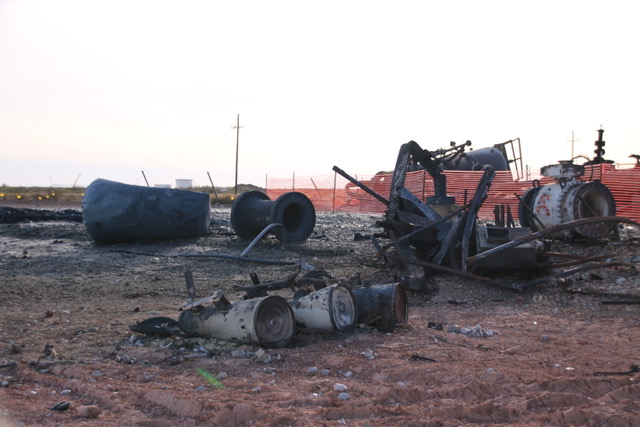It seems as if Energy Transfer’s executives are living in a completely different world than the rest of us. In one world, bigwigs like CEO Kelcy Warren are celebrating the company’s successful merger from two entities – Energy Transfer Partners (ETP) and Energy Transfer Equity (ETE) – into one, simplified Energy Transfer (ET). The ET merger benefits top execs like Warren, while ripping off investors with slashed distribution cuts.
In the other world, Energy Transfer continues to leave behind a wake of destruction and deceit while doing its dirty business. Here are the grim highlights:
An explosion in Texas… and a cover up?
Let’s begin our roundup in Coyanosa, Texas, where Energy Transfer operates a gas plant, numerous compressors, and a network of intersecting pipelines called the Waha Hub. The gas plant has been prone to problems before; in November of 2017, Earthworks documented disturbing black flaring at the site, and it did not look pretty:
Fast forward just over a year to November 23, 2018: this time a pipeline connected to that plant exploded, hospitalizing two contractors. Here’s a snapshot of what that looked like:
Gotta love living near the oilfields. Processing plant blew up today we need to invest in green energy already. We live in a dry, windy area. Thankfully the fire didn’t spread. #WAHA #ETP #Explosion #Coyanosa #GreenEnergy #Fire pic.twitter.com/mfGcdCtlkt
— Damian (@BillieLurkTwerk) November 23, 2018
A few days after the explosion rocked Coyanosa, local organizer Lori Glover drove to the site to investigate. Upon arrival, she took several photos of the wreckage. Here’s one shot:
As she prepared to leave, Lori was accosted by a worker at the site, who blocked her from leaving with his truck until she handed over her camera’s memory card. Thankfully, Lori was able to leave the site and managed to keep her documentation. The situation certainly makes one wonder, what is Energy Transfer trying to hide here?
Breaking records (not the good kind)
Last Wednesday, Energy Transfer made more headlines, as Reuters calculated that the company has racked up over 800 violations in its construction of the Mariner East and Rover pipelines alone. In the article, Energy Transfer was listed as one of the “worst among all pipeline companies in average annual incidents” involving hazardous liquids. There could be a silver lining for communities though, as the “recent experience of residents and regulators with the two Energy Transfer pipelines has state officials vowing to tighten laws and scrutinize future projects.”
ANOTHER spill for Energy Transfer Partners, the company behind the Dakota Access Pipeline https://t.co/DTDYaPJOgn #StopETP #NoDAPL pic.twitter.com/o4X13cVyeX
— Greenpeace (@Greenpeace) January 17, 2018
Losing shippers for Mariner East?
On Friday, AP reported that Energy Transfer is seeking new shippers of natural gas liquids for its Mariner East pipeline system. This new open season suggests that perhaps all of the delays, spills, and violations have resulted in lost business for ET. While we can’t be certain, evidence certainly points in that direction.
What next?
All of the above shenanigans occurred between November 23 and 30. Who knows what next week will bring, but one thing is for certain: landowners, indigenous groups, frontline activists, and increasingly policymakers will continue to demand accountability from this rogue, out of control company. We may need to technically change the hashtag from #StopETP to #StopET, but the sentiment is still the same.

